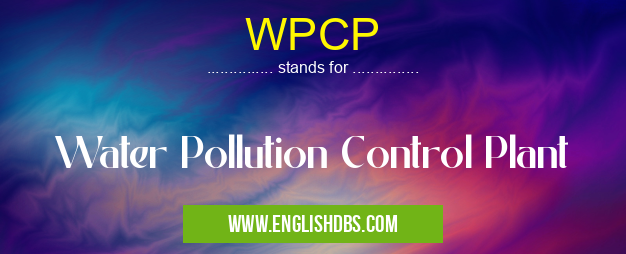What does WPCP mean in COMMUNITY
Water Pollution Control Plants (WPCPs) are facilities designed to reduce the amount of pollutants found in water bodies such as rivers, lakes, and oceans. WPCPs are used to treat waste water before it is discharged into a body of water or reused. They can also be used to improve the quality of industrial wastewater prior to its release into a natural body of water.

WPCP meaning in Community in Community
WPCP mostly used in an acronym Community in Category Community that means Water Pollution Control Plant
Shorthand: WPCP,
Full Form: Water Pollution Control Plant
For more information of "Water Pollution Control Plant", see the section below.
Essential Questions and Answers on Water Pollution Control Plant in "COMMUNITY»COMMUNITY"
What does WPCP stand for?
WPCP stands for Water Pollution Control Plant.
What kind of pollutants are targeted by WPCPs?
WPCPs target a variety of pollutants, such as heavy metals, suspended solids, oils, grease, and other hazardous materials.
How do WPCPs work?
WPCPs use a combination of physical, chemical and biological processes to remove pollutants from wastewater before it is released back into the environment. Physical processes involve the physical removal or separation of particles from the wastewater stream; chemical processes involve introducing agents that either absorb or neutralize contaminants; and biological processes involve utilizing microorganisms to breakdown organic matter contained in the wastewater stream.
How can I know if a certain type or size of WPCP is suitable for my business needs?
The design and size of a WPCP depends on various factors including the type and flow rate of wastewater being treated as well as the types and levels of pollutants contained within it. It is important to consult an expert who can help determine which type and size of WPCP is best suited for your specific needs.
Are there any regulations regarding discharge from WPCPs?
Yes, there are national and international regulations governing how much pollution can be discharged from a WPCP into a natural body if water such as rivers or seas. Depending on local restrictions these may differ slightly so it is important to consult with your local regulatory agency before commencing works at a WPCP site Discharge from industrial sites must also follow strict guidelines set out in relevant legislation.
Final Words:
Water Pollution Control Plants (WPCPs) are essential facilities for controlling pollution in our waterways by reducing harmful substances found in industrial waste waters before they enter our natural resources or can be reused elsewhere. Through physical, chemical and biological processes they ensure that all effluent discharged meets regulatory requirements and that our aquatic environment remains clean and healthy for future generations.
